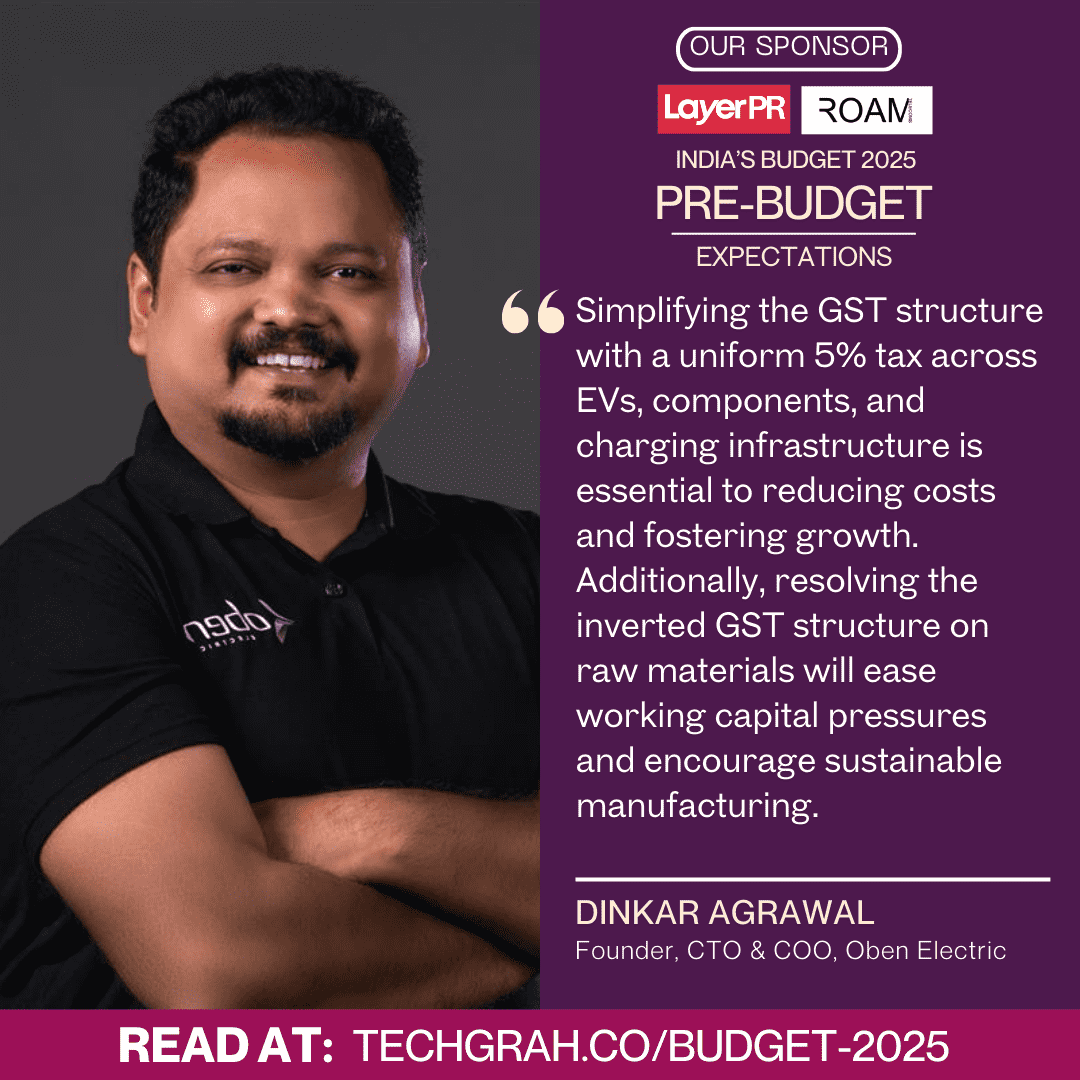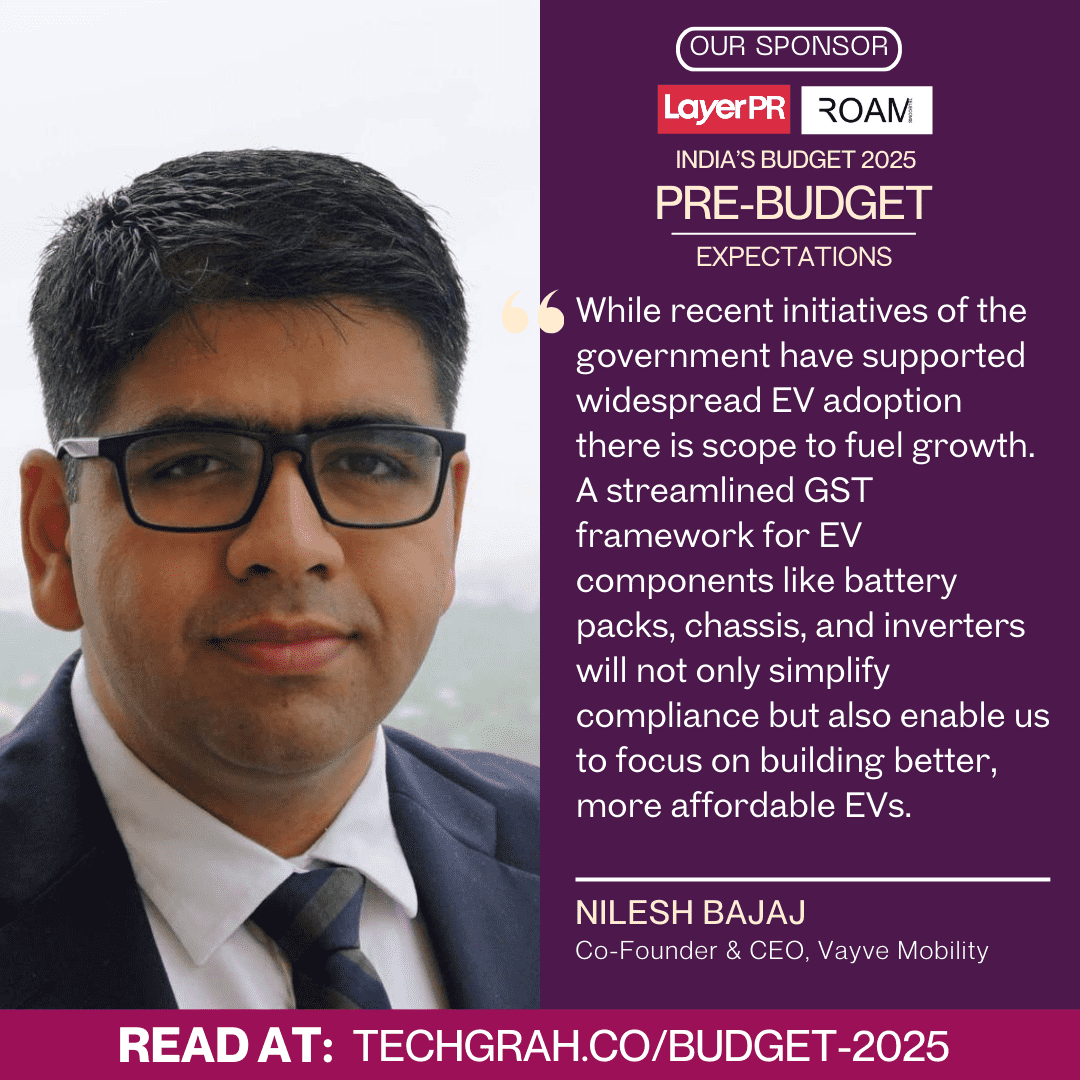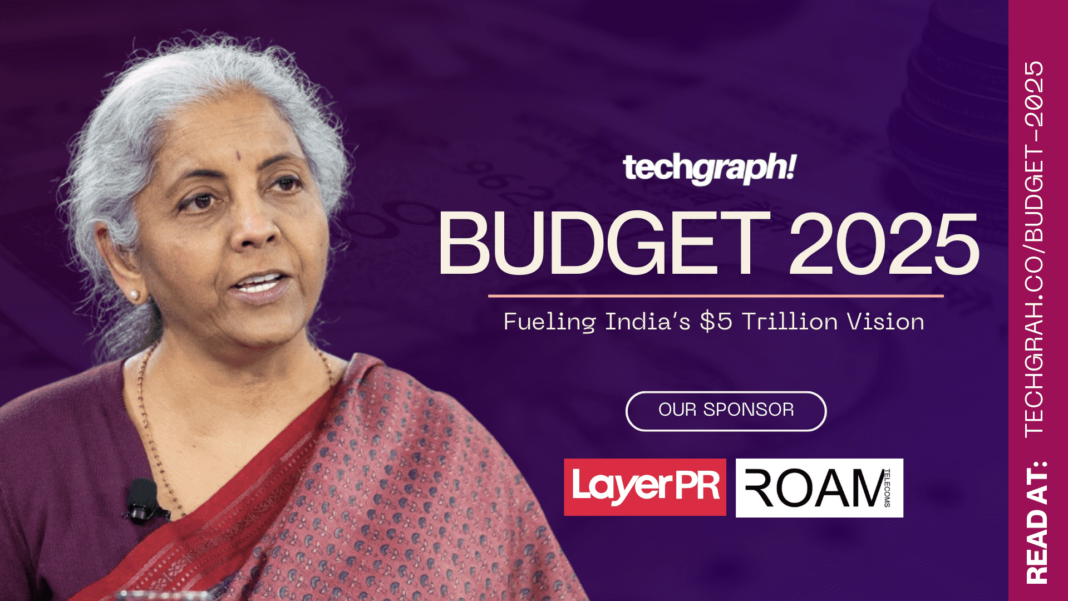As the date for the Union Budget 2025 draws near, the electric vehicle (EV) industry has outlined specific expectations that aim to accelerate growth and bolster domestic manufacturing. Industry leaders are particularly advocating for a uniform 5% GST across EVs, their components, and the associated charging infrastructure to simplify the tax system and drive down costs.
Another priority is the overhaul of the input tax credit (ITC) refund process, which could provide critical liquidity for startups. In addition, increased government support for public-private partnerships and adjustments to the Production-Linked Incentive (PLI) scheme are seen as crucial steps to enhance the sector’s competitiveness and innovation.
Read the union budget 2025 expectations in detail from Electric Vehicles & E-bike industry leaders:
Dinkar Agrawal, Founder, CTO & COO, Oben Electric

The Union Budget 2025 is a critical opportunity to address key challenges in India’s EV transition. To achieve the ambitious target of 30% EV penetration by 2030, it’s crucial to tackle both manufacturing and consumer-centric challenges.
Simplifying the GST structure with a uniform 5% tax across EVs, components, and charging infrastructure is essential to reducing costs and fostering growth. Additionally, resolving the inverted GST structure on raw materials will ease working capital pressures and encourage sustainable manufacturing.
Performance-linked incentives for battery innovation and indigenous component manufacturing can further strengthen India’s Make-in-India push, positioning the country as a global leader in EV technology. On the consumer front, initiatives like reduced interest rates on EV loans and targeted subsidies can make electric vehicles more accessible, bridging the affordability gap.
Nilesh Bajaj, Co-Founder & CEO, Vayve Mobility

The Union Budget 2025 presents a significant opportunity to accelerate India’s transition to sustainable urban mobility. While recent initiatives of the government have supported widespread EV adoption there is scope to fuel growth. A streamlined GST framework for EV components like battery packs, chassis, and inverters will not only simplify compliance but also enable us to focus on building better, more affordable EVs.
The inverted duty structure, where key inputs like lithium-ion batteries attract higher GST than the EV itself, impacts cash flow and increases production costs. Simplifying the refund process for input tax credits (ITC), including capital goods, would provide much-needed working capital support for early-stage startups. Increased budget allocation for public-private partnerships in the EV space would foster consumer confidence in adopting EVs.
Enhanced PLI Schemes by leasing domestic value addition (DVA) requirements and ensuring faster disbursements can boost local EV manufacturing and scale innovative solutions. A clear roadmap outlining the future of these incentives would help consumers plan their purchases confidently and allow OEMs to align their production strategies with policy timelines.
At Vayve Mobility, we’re passionate about redefining personal mobility for Indian cities. With the right support from the Union Budget, we believe we can lead the way in making electric mobility more efficient, accessible, and sustainable for all.
Kunal Arya, Co-Founder & Managing Director, ZELIO E Mobility Ltd.

As India’s electric mobility sector gears up for an era of unprecedented growth, the Union Budget 2025-26 will play a critical role in shaping its trajectory. To ensure a sustainable future, we at ZELIO E Mobility believe that the government must introduce long-term subsidies akin to the FAME scheme, which will not only support the industry’s expansion but also encourage widespread consumer adoption of electric vehicles.
Consistent policy backing will give manufacturers the confidence to invest in innovative solutions and scale production. We also urge the government to provide subsidies for the establishment of EV manufacturing plants. Facilitating this capital-intensive infrastructure will enable India to emerge as a global leader in EV production, stimulating local economies and fostering technological advancements.
Simplifying access to financial services from banking institutions is another vital need of the industry. More accessible lending schemes and flexible credit options will allow EV manufacturers to expand their operations and bring high-quality products to market at a faster pace. Notably, we request a reduction in GST on spare parts from the current 28% to a more realistic range of 5-12%. This adjustment will substantially reduce production costs, allowing manufacturers to pass on the benefits to consumers, thereby further accelerating the adoption of electric vehicles.
Karam S Dhillon, Founder, Perpetuity Capital

As we approach the upcoming budget, it’s crucial to recognize the pivotal role that subsidies on electric vehicles (EVs) have played in accelerating the transition to a sustainable future.
Reducing these subsidies now could undermine the momentum the EV sector has built and disrupt the progress we’ve made toward cleaner transportation. Continued financial support for at least another year is essential to ensure that consumers remain incentivized to make the switch to EVs.
Without these incentives, many will likely revert to cheaper, traditional petrol or diesel vehicles, hindering our collective efforts to reduce carbon emissions and achieve long-term sustainability goals.




